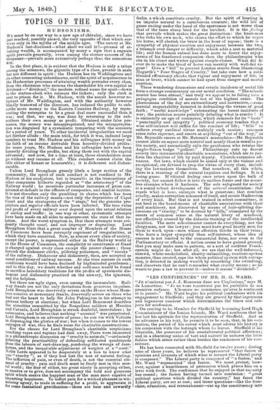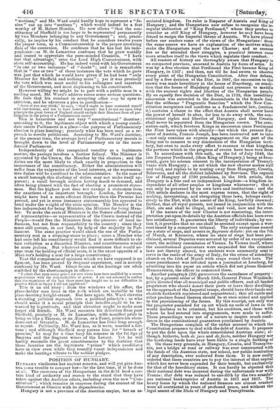"LES CONFIDENCES" OF MR. H. G. WARD.
"JE n'imiterai pas J. J. Rousseau dans sea Confessions," says M. de Lamartine. " Je ne rims rdconterai pas lea puerilites de ina, premiere enfance. L'homme ne commence qu'avec le sentiment et la pensee." Mr. Ward begins his political confessions with his engagement to Sheffield; and they are graced by that ingenuous and ingenious candour which discriminates the times and sub- jects for confession.
On ceasing to be Member for Sheffield by becoming Lord High Commissioner of the Ionian Islands, Mr. Ward confesses that he has lost his aptitude for the representation of Sheffield. And as he advances in his text, he permits it to be seen, that, in his esti- mation, the period of his career which most adorns his history is his connexion with the borough whom he leaves. Sheffield is his Graziella, the possessor of his unadulterated political affections; and in a charming union of tact and naivete he unbares the little foibles which attest rather than burden the tenderness of his con- science.
He has been connected with Sheffield for twelve years; during nine of those years, he believes he represented "that fusion of opinions and interests of which what is termed the Liberal party is composed." The Liberal party is composed of "a fusion," and Mr. Ward " represented " that fusion. We must protest, how- ever, against a humbleness of pretension which places him on a level with froth. The confidence that he enjoyed in that capacity has ceased ; the fusion having turned into confusion : "great political questions which divided the country," but fused the Liberal party, are set at rest ; and lesser questions—like the fran- chise, education, and retrenchment—cut up the constituency into
"sections," and Mr. Ward could hardly hope to represent a "fu- sion" cut up into "sections "; which would indeed be a feat worthy of M. Robert Houdin. He now allows "that the con- stittiency'of Sheffield is too large to be represented permanently by 'two Members belonging to any Government "; and, practi- cally, he implies by his conduct that he considers twelve years the proper term, as a Commissionership is the proper crowning finis of the connexion. He confesses that he has lost his inde- pendence—as M. de Lamartine confesses. that he grew worldly and ceased to appreciate the pure-minded Graziella. "I have lost that advantage," cries the Lord High Commissioner, with stern self-accounting. He has indeed voted with his Government "in one or two instances" of " doubt "; and it is remarkable that in "one or two" of those instances the vote which he gave was just that which he would have given if he had been "only Member for Sheffield and nothing more"; yet it was precisely the vote which was most useful to his colleagues and superiors of the Government, and most displeasing to his constituents. "However willing we might be to part with a public man in a smiling mood, Mr. Ward's address raises some serious questions. He feels that his conduct in accepting office may be open to criticism, and he advances a plea in justification— 'Some ot you may think," he says, "that I ought to have contented myself with that honour, and not to have looked beyond: but I do not see upon what principle the great towns of England should exclude their Members from all par- ticip,ation in the prizes of a Parliamentary career."
This is hazardous and not very " constitutional" doctrine : according to it, the legitimate object with which a young candi- date enters Parliament is a place—the purpose of Parliamentary election is place-hunting; precisely what has been used as a re- proach to servile politicians. According to Mr. Ward's doctrine, at the present time, the average level of Parliamentary morals is brought down to the level of Parliamentary sin in the unre- formed Parliament.
Independently of this recognized venality as a legitimate motive, the passage involves a further fallacy. The Minister is appointed by the Crown, the Member by the electors ; and the duties are the more likely to clash exactly in proportion to the importance of the constituency. Either the administration will suffer from the exigencies of the local interests, or the representa- tive duties will be sacrificed to the administrative. In the case of a small borough this clashing of duties may not make itself ap- parent; a small borough seldom having much to demand, and often being pleased with the fact of electing a prominent states- man. But the highest post does not exempt a statesman from the exactions of an important borough : London, for instance, might have had a more efficient Member than the Premier has proved, and yet in some instances statesmanship has appeared to bend under the weight of the civic opinion. The Member is the less independent for being Minister, the Minister for being Mem- ber. To make the seats of Ministers in the Senate official instead of representative—or representative of the Crown instead of the People—would free the Ministers from the pressure of local in- fluences, but not from responsibility to the country ; since they must still govern, in our land, by help of the majority in Par- liament. The same practice would check the use of the Parlia- mentary seat as a stepping-stone to place ; since a Member who had once left his constituency would find it more difficult to ob- tain reelection as a discarded Minister, and constituencies would be more jealous. But whatever the convenience that would ac- crue from the holding of official seats, it is the exact opposite of a Minister's holding a seat for a large constituency. That the compromise of opinions which we have supposed is no figment, has been proved by frequent experience, and is naively confessed by Mr. Ward. Great boasts at the hustings are often stultified by the shortcomings in office-
" I admit that upon many points my own views have been modified by a nearer acquaintance with the responsibilities of power. I am not ashamed to confess that the experience of the last three years has taught me to see difficulties in practice which in theory I did not apprehend."
This is an old story : from the windows of his office, the place-holder sees lions in the path which are invisible to the place-hunting knight-errant. But here again Mr. Ward elevates a standing political reproach into a political principle ; as who should make it a moral principle that benefits ought to be re- warded by ingratitude, and that elevation ought to make men forget old friends. Mr. Ward recounts his defection from poor Sheffield, precisely as M. de Lamartine, with manifest pride in being so like a Theseus, or an .7Bneas, or a Faust, paints his aban- donment of Graziella. M. de Lamartine has lived long enough to repent. Politically, Mr. Ward has, as it were, married a for- tune ; and although Sheffield may pursue him for " breach of promise," he may for a time bury his remorse in the fat figs of Smyrna and the fragrant wines of the Levant. Yet he will hardly reconcile the great constituencies to the doctrine that those luxuries are the legitimate " prizes " which candidates have in view even while they roundly vaunt independence and make the hustings vibrate to the noblest pledges.



























 Previous page
Previous page